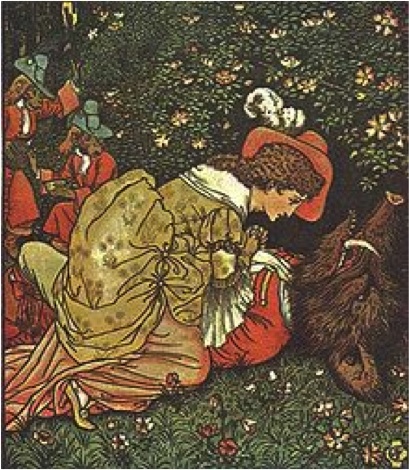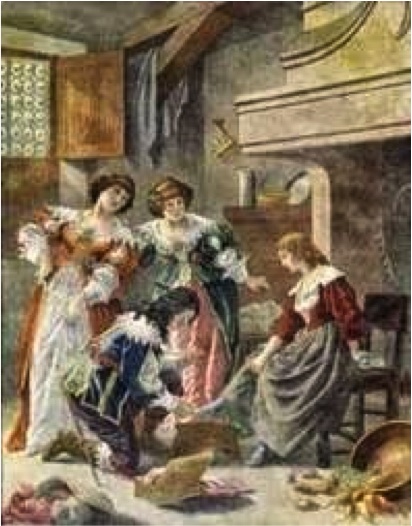“I think the poets have made a mistake: because the world of the fairy-tales is a brighter and more varied world than ours, they have fancied it less moral; really it is brighter and more varied because it is more moral.”
-G.K. Chesterton
I am going to do something very dangerous, I am going to debate a point—posthumously—with arguably one of the most influential and well-respected commentators and moralists of the Western world, G.K. Chesterton, who wrote extensively and eloquently on many subjects, among them fairytales. (And also had a great head of hair.) You may not have heard of Chesterton, but if you are a fan of fairytales, which, if you’re reading this you probably are, then you have almost certainly stumbled across a quote of his that has been often repeated without attribution:
Fairy tales do not tell children the dragons exist. Children already know that dragons exist. Fairy tales tell children the dragons can be killed.
Now, I do not claim to have a tenth the knowledge of fairytales that Chesterton does, and I’m certain that were the great man still alive today he would wipe the floor with me, nevertheless, I not only am going to disagree with him, I am going to disagree with him about something that most people believe: that fairytales are inherently moral or at least that they provide moral guidance. The fact is that as much as I think that they are entertaining, and in their original forms often wickedly and subversively so, I also think that fairytales are a very dangerous place to seek guidance of any sort—particularly moral guidance.
So, let’s lay down the ground rules. I’m going to select two classical fairytales that are generally considered to teach a valuable moral lesson. In selecting these stories I am going to pass over some fairytales like Bluebeard that have truly horrible things to teach us about morality. (i.e. listen to your husbands, ladies, or you may end up slaughtered in your basement.) I will also pass over the clearly amoral stories like Sleeping Beauty where punishment is exacted on an innocent with no consequence. And, I will not even mention Hans Christen Anderson except to say that if you read The Red Shoes or The Little Mermaid you might come to the conclusion that he really didn’t like children at all. Instead, I am going to focus on fairytales that most people naturally assume have a moral, but in which the moral is subsumed by one or more gross immoralities also taught by the story.
The Beauty And The Beast: “Don’t judge a book by its cover.”

“Beauty,” said this lady, “come and receive the reward of your judicious choice; you have preferred virtue before either wit or beauty, and deserve to find a person in whom all these qualifications are united. You are going to be a great queen. I hope the throne will not lessen your virtue, or make you forget yourself.”
Here then is the moral we are meant to take from the story The Beauty and The Beast, as most famously told by Mme. Leprince de Beaumont in the 18th century, that Beauty’s ability to see the good virtues of the Beast, despite his outward appearance, is laudable and leads to good things. In the story it cannot be doubted that Beauty’s behavior is exemplary. When her father is in financial trouble she asks for no gift, when she does ask for something it is a single rose, and she only asks for that so her abstinence would not silently condemn her sisters for their own lavish desires. When her father returns home and tells them that by picking the rose for Beauty he has doomed himself to die at the Beast’s hands unless one of his daughter’s takes his place, it is Beauty that insists on going. And so on. It is also true that the Beast is generous and kind to Beauty once she arrives, giving her no cause, except through his ghastly appearance, to believe he is evil or has evil intentions. All that is required for the ‘happily ever after’ to arrive is for Beauty’s virtue and kindness to see through the outward bestial mask the Beast has been cursed with. And she does.
The moral in this framing of the story is easy to see, but the problem is in how we come to this happy end. First, it must be remembered that the only reason Beauty and the Beast are together is that the Beast threatens Beauty’s father with death unless one of his daughter’s takes his place. Nor is it ever promised or assumed that the Beast will be kind to the girl. Instead, Beauty and her family all truly believe that the creature will kill her as soon as she is delivered to him.
As soon as he was gone, Beauty sat down in the great hall, and fell a crying likewise; but as she was mistress of a great deal of resolution, she recommended herself to God, and resolved not to be uneasy the little time she had to live; for she firmly believed Beast would eat her up that night.
Now Chesterton would tell you that all of this was justified, because the father stole a rose from the Beast’s garden. Indeed, he wrote a long essay in which he says that the real morality taught by fairytales is that “all happiness hangs on one thin veto; all positive joy depends on one negative.” In other words that the act of taking the rose justifies the extraordinary punishment meted out to him and by fiat on his innocent daughter.
I suppose I might agree with Mr. Chesterton were the Beast a true innocent. In other words, were the Beast to have no motive behind the punishment except a desire for justice, but in truth the Beast is himself under a fairy curse that requires him to get a maiden to fall in love with him (in the original being measured by whether she would sleep with him). So, rather than being an innocent, the Beast is a hunter that actively sets out to entrap Beauty’s father to get the girl. And what a job he does trapping him.
In the story Beauty’s father is lost in the woods and stumbles upon the Beast’s apparently abandoned castle. In most versions the man is, at first, very reticent to intrude, but things simply keep appearing to satisfy his needs. He is cold and there is a fire. He is wet and there are dry clothes. He is hungry and there is food. He naturally assumes (with typical fairytale logic) that some good fairy has placed this castle in his path to help him. Tragically he is mistaken.
On his way home, the man passes an arbor in the Beast’s garden filled with roses and remembers Beauty’s request and plucks one—and is doomed. Unlike the similar parable in the garden of Eden, there was no warning given that the roses were off-limits, and in all other things Beauty’s father was free to indulge. One could rightly ask that had it not been the rose would the Beast not have found some other pretext to seize the man? If there is justice here it is an arbitrary and capricious justice that undermines the moral lesson. Does the Beast’s later behavior toward Beauty excuse his earlier cruelty? Why can the Beast, of all the characters in the story, show this dual nature (good and evil) and still be redeemed while Beauty must be perfectly virtuous? If there is a moral here, it is difficult to find among the weeds of bad behavior and cruelty.
Cinderella: “Goodness is rewarded and meanness is punished”

“When the wedding with the prince was to be held, the two false sisters came, wanting to gain favor with Cinderella and to share her good fortune. When the bridal couple walked into the church, the older sister walked on their right side and the younger on their left side, and the pigeons pecked out one eye from each of them. Afterwards, as they came out of the church, the older one was on the left side, and the younger one on the right side, and then the pigeons pecked out the other eye from each of them. And thus, for their wickedness and falsehood, they were punished with blindness as long as they lived.”
Cinderella would appear to have a very straightforward moral: honesty and goodness are rewarded and “wickedness and falsehood” are punished—and punished quite severely I might add. But, this moral judgment is applied, as in Beauty and the Beast, in a manner so sloppy and indiscriminate that it undercuts the entire lesson.
First and foremost, Cinderella’s stepmother would appear to be far more guilty of the crimes of wickedness and falsehood than the stepsisters. Consider, it is the stepmother, not the stepsisters, that makes and then breaks a promise to Cinderella to allow her to go to the King’s ball if she finishes her chores. Also, it is the stepmother, not the stepsisters, that comes up with the plan to cut off pieces of the stepsisters’ feet so the glass slipper will fit them. Despite all this, the stepmother escapes the story unpunished. As does, I may mention, the most monstrous of the characters in the story—Cinderella’s father.
Here is a man that allows his actual daughter to suffer horribly at the hands of his new wife and daughters and does nothing. And, there can be no doubt of his not knowing about this. Consider the way the story describes Cinderella’s life after the father adopts his new family.
They took her beautiful clothes away from her, dressed her in an old gray smock, and gave her wooden shoes. “Just look at the proud princess! How decked out she is!” they shouted and laughed as they led her into the kitchen. There she had to do hard work from morning until evening, get up before daybreak, carry water, make the fires, cook, and wash. Besides this, the sisters did everything imaginable to hurt her. They made fun of her, scattered peas and lentils into the ashes for her, so that she had to sit and pick them out again. In the evening when she had worked herself weary, there was no bed for her. Instead she had to sleep by the hearth in the ashes. And because she always looked dusty and dirty, they called her Cinderella.
There is simply no way that the father could not notice that his daughter, who his new wife had taken to calling Cinderella, had no nice things to wear, or was constantly slaving away, or slept in the hearth and was filthy. Worse still, when the prince asks the father directly whether or not he has a daughter besides the stepsisters he lies.
No,” said the man. “There is only deformed little Cinderella from my first wife, but she cannot possibly be the bride.”
The father’s betrayal here is difficult to understand and impossible to condone. And yet, again, he escapes the story with no consequence. There is no moral sanction here. This by the way is a common problem in many fairytale stories, where the father’s cruelty or negligence are excused.
-

In Hansel and Gretel, the wife may come up with the plan to abandon the children in the woods, but it is the woodcutter that actually goes through with it. For this crime the wife dies and the woodcutter lives happily ever after with the children he betrayed.
- In Snow White it is without dispute that the stepmother is evil (trying four times to kill the girl), and for her crimes she is placed into burning-hot shoes and forced to dance until she dies. What about Snow White’s father? He is alive throughout the story and presumably never notices when his only precious daughter disappears from his castle. There is absentmindedness and then there is gross negligence.
- People often say that the miller’s daughter inRumpelstiltskin deserved to lose her child, because she deceived the king into thinking she could spin straw into gold, and yet no one mentions that it is her father that tells the original lie, and twice the king threatens to kill her if she does not complete the task.
Chesterton, in summing up his views on fairytale morality writes:
It is surely obvious that all ethics ought to be taught to this fairy-tale tune; that, if one does the thing forbidden, one imperils all the things provided. A man who breaks his promise to his wife ought to be reminded that, even if she is a cat, the case of the fairy-cat shows that such conduct may be incautious. A burglar just about to open some one else’s safe should be playfully reminded that he is in the perilous posture of the beautiful Pandora: he is about to lift the forbidden lid and loosen evils unknown. The boy eating some one’s apples in some one’s apple tree should be a reminder that he has come to a mystical moment of his life, when one apple may rob him of all others.
In Chesterton’s view of fairytale morality it is fine that in failing to invite the fairy to the christening you may have just sentenced your daughter to death, or in plucking the rose from the beast’s garden you may forfeit your life, because it teaches us how tenuous is our position in this world. And, perhaps this point is defensible, though I think the draconian nature of the punishments undercuts the morality of the judgment. However, whether you agree with me or Chesterton on that point, for punishment to be moral and just it must be applied evenly and to all. Martin Luther King said, “Injustice anywhere is a threat to justice everywhere.” Fairytales simply do not follow this maxim. Punishment is too often applied to those least culpable, or to those completely innocent, leaving the real villain (and often the powerful and male characters) unscathed. Without this basic thread of fairness it is better to read fairytales for entertainment and seek your moral lessons in a more reliable place—perhaps fortune cookies or the Sunday comics.
Jack Heckel is the writing team of John Peck, an IP attorney living in Long Beach, CA who is looking forward to the upcoming release of Once Upon a Rhyme, and Harry Heckel, a roleplaying game designer and fantasy author, who is looking forward to the publication of Happily Never After.










